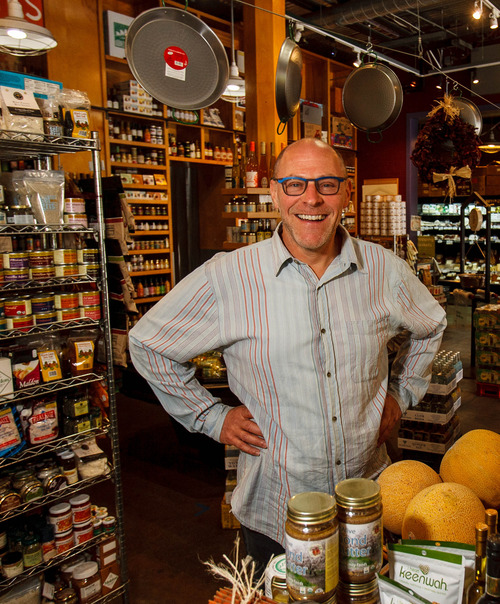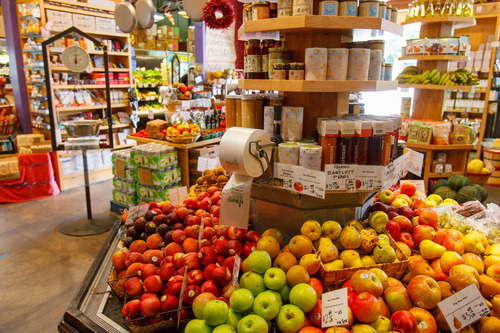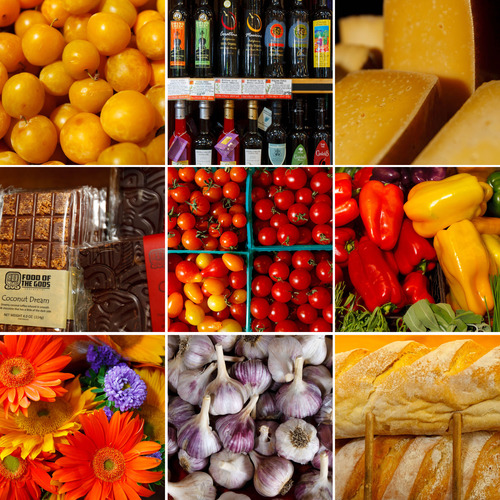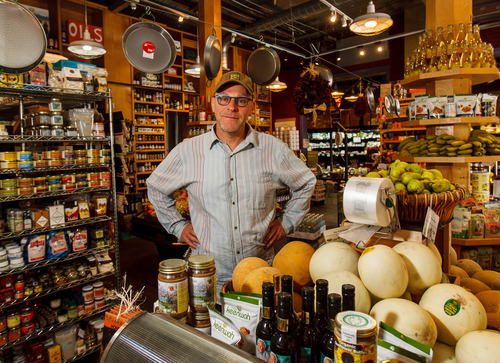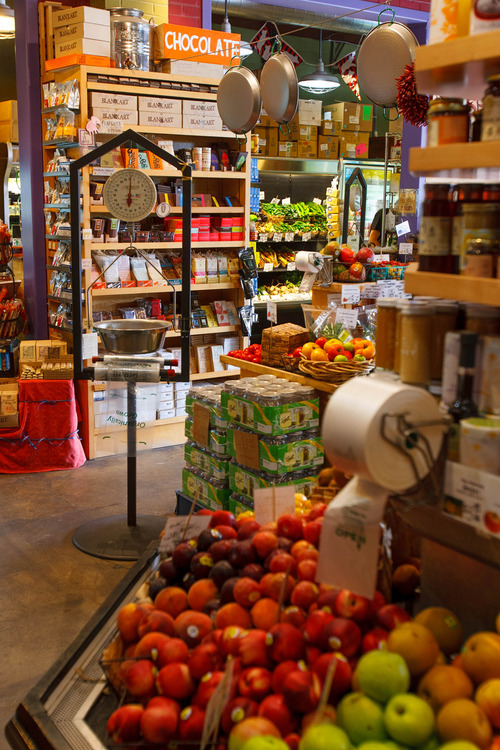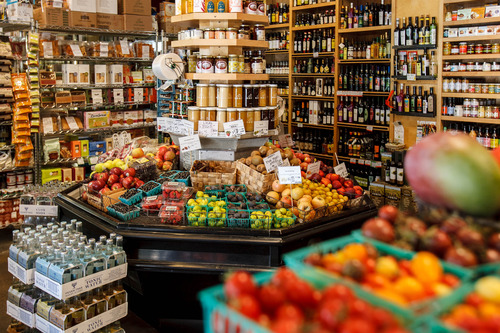This is an archived article that was published on sltrib.com in 2013, and information in the article may be outdated. It is provided only for personal research purposes and may not be reprinted.
Steven Rosenberg can easily describe the cold pasteurization process that makes the Rosehill Dairy milk sold at Liberty Heights Fresh so sweet. And the store's self-titled Chief Eating Officer has seen the red angus cattle herd in Altamont, the sole fresh beef he sells, and knows the only grain they eat would be the seeds off a wild grass head.
But it is before the wall of extra virgin olive oil where the 53-year-old distills his food philosophy.
The best olive oil is pressed as the fruit starts to turn from green to purple, he says. That's also the time olives have the least oil to give.
This emphasis on quality over quantity — and charging top dollar for it —is the hallmark of the Salt Lake City specialty market that is celebrating its 20th anniversary this month.
Amid Utah's bulk-buying culture, Rosenberg was a pioneer, seeking out not the least expensive goods but what he considers the best authentic, hand-crafted cuisine. All the while, he pressed Utahns to "Hey, eat" — and eat well.
The impact of the store is felt beyond its 2,100 square feet. When publications like Zagat label Salt Lake City an "up-and-coming food city," the roots were planted at this former gas station.
—
Beginnings • Liberty Heights opened before food journalist and author Michael Pollan — whom Rosenberg has shared a meal with and admires— was writing books that questioned America's industrial food production and popularized eating traditional foods with real ingredients.
Back in 1993, few Utah shoppers cared about local ingredients; bigger was better.
"It was, how heaping could my plate be for $3, instead of [considering] the integrity and quality of the food," Rosenberg recalls.
When Rosenberg opened, selling fresh fruits and vegetables and cut flowers, food distributors told him he would close if he didn't sell candy and cigarettes.
But he knew there was a better way to eat, and the Jewish transplant made it his mission to show Utahns the way.
He had grown up on a 425-acre fruit and vegetable farm in southwest Michigan, where he picked fruit, harvested vegetables, pruned trees, hoed fields.
Orchards still have a magical hold over him. "If there were chores to do, I could climb a tree and nobody could find me. I could fill my belly with good fruit, sitting on a limb out in nature, hearing birds sing and seeing the clouds and blue sky," he says.
Family meals were made of food from their farm, along with eggs from neighbors and milk in glass bottles delivered by the local dairy, he says.
Rosenberg carries the 50-year-old scar where his left thumb was reattached after an accident in the apple packaging shed, as well as a deep love and respect for people who work the land.
But economic uncertainties led him to leave the farm and seek a job with a food wholesale company, after earning a degree in agricultural economics from Michigan State University. His employer relocated him to Utah. He moved to Miami for a time to work in the cut-flower industry and then returned to Salt Lake to work on films in production management.
But instead of pursuing a career in Hollywood, Rosenberg returned to his roots. He found the empty gas station for rent at 1290 S. 1100 East, which is not so strange, since one of his first jobs outside his family farm was selling produce at an open-air market in a former gas station.
—
Best of the best • To work at Liberty Heights Fresh, applicants are required to write a one-page essay about their feelings for food. If Rosenberg had to apply, he'd share his revelation that came from eating sausage.
He was 8 or 9 and family friends from Chicago had come to the farm bearing homemade calabrese sausage, packed with fennel seed. As Jews, the family didn't eat pork, but they made an exception.
"I could burst. I would just stuff myself with it because it was so delicious," he says. "That was really where the seed was planted … in me to realize as great as the food is here on the farm, there's more great food out in the world."
That's how Rosenberg ended up traveling to Spain, Italy, France, Ireland, Chile and beyond to find what he considers the best in specific food categories including cheeses, cured and fresh meats, olives, olive oils, vinegars, produce, pasta, grains and baked goods.
Liberty Heights is a foodie playland. Customers can buy sunflower butter, Ethiopian Berberé spice mixture, scarlet runner heirloom beans, Italian truffle honey, fregola sarda pasta, watermelon puree, rendered duck fat, a tin of octopus packed in olive oil, quince paste, chocolate-infused chevre truffles and nonalcoholic chardonnay soda.
As he's stocked his shelves, Rosenberg has helped make the cheese, learned to identify defects in olive oil through smell and verified on ranch visits that the animals — for the all-local beef, pork and lamb he sells —had space to roam and eat a natural diet.
Pete Schropp and Jennifer Hines, owners of Rockhill Creamery in Richmond, consider Rosenberg a mentor. They sought his advice on what types of cheeses to make, forgoing feta for a gruyere, gouda and edam, which are sold at Liberty Heights among other places.
"He's been up here a couple times a year," says Schropp. "He's just a very dedicated food lover."
—
Devoted customers • On a recent day, Gerry Rothstein stopped by for fresh figs. He has been a customer from the start and shops for house-made sandwiches, Logan-based Crumb Brothers bread, Provo's Clifford Family Farm eggs and seafood.
"I buy my tuna here because I don't like cat food and I feel like that's what I'm going to get if I go to the grocery store," he said. "If I'm told it's going to be good, it'll be good."
Carola Mone said it was a visit to Liberty Heights that persuaded her to move to Utah from California 16 years ago. She now stops by regularly for Rustic Bakery cookies made in California and organic and local produce. On a recent day there were five varieties of organic beets, organic apples with pink flesh, local currants, tomatoes and plums.
"He has the closest thing to a farmers market in Southern California that you can get," she said. "I wouldn't survive if it weren't for here … but I'm financially able to handle it."
The cost of items — $13.99 for a pint of ice cream or $37.99 for an olive oil from fruit picked the first day of harvest — has earned the shop the nickname "Liberty Heist."
Rosenberg shrugs it off with an analogy.
"You wouldn't go to the BMW dealership with a quote from the Hyundai dealer and say match the price," he says. "We're not selling ordinary food and we're not selling the second or third or fourth best in a category. We're selling the best we can find."
It may be high end, but Liberty Heights also accepts food stamps, notes Gina Cornia, executive director of Utahns Against Hunger, where Rosenberg was a board member. Both have also worked together on Salt Lake City Mayor Ralph Becker's Food Policy Task Force, which is working on improving availability of fresh and nutritious food.
Cornia said Rosenberg pushed her to think about giving the poor access to not just food, but healthy food. The organization now funds farmers markets to accept food stamps and created a farmer to grow organic vegetables to give to the food pantry.
Even if you don't shop at Liberty Heights, you've felt Rosenberg's influence, say admirers, including competitors whose ranks have grown in the past two decades. Whole Foods, Sprouts Farmers Market, Trader Joe's and Real Foods Market opened after Liberty Heights did. And Harmons only recently began offering an improved selection of local and hand-crafted goods.
"His store has set the level of excellence that has definitely propelled me forward to bigger and better things, more so than any other store in Utah," says Matt Caputo, marketing director for Caputo's Market & Deli, which opened four years after Liberty Heights.
Ali Sabbah, owner of Mazza Middle Eastern Cuisine, says his close friend has been on a successful mission to help Utahns discover great food. "Everything you see right now about farm-to-table, and caring about local and organic food and producing food as a craft — his place is the catalyst for all of that," says Sabbah. "He laments the fact that a lot of people eat junk and crap and don't worry about what they're stuffing in their mouths."
Rosenberg wants people to smile when they eat food from his store. His family tells him that when he was a child and it was dinner time, he would come running with his arms back and his mouth wide open.
Liberty Heights Celebrates
To celebrate its 20th anniversary, Liberty Heights Fresh is offering daily deals throughout the month of September. The store also will host an open house and festival with free tastings from local artisan food producers.
When • Friday, Sept. 6, 4-8 p.m., and Saturday, Sept. 7, 3-8 p.m.
Where • Liberty Heights Fresh, 1290 S. 1100 East, Salt Lake City; 801-467-2434.


